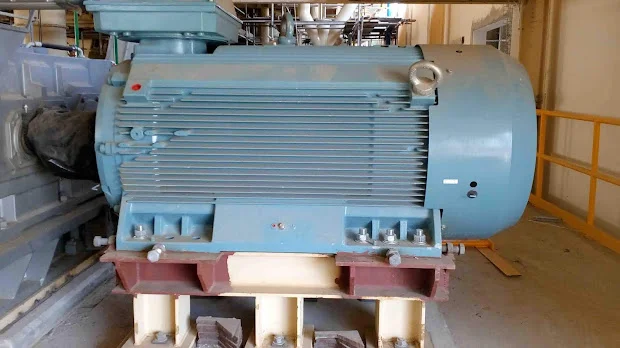In the fast-paced and demanding world of Engineering, Procurement, Construction, and Installation (EPCI) projects, motor maintenance is a critical yet often overlooked component that determines the success or failure of large-scale operations. Across Nigerian industrial landscapes, motors serve as the heartbeat of critical equipment, ensuring seamless operation and maintaining the efficiency of mechanical systems. Any failure in motor performance can result in costly downtimes, missed project deadlines, and increased operational risks. Understanding the complexities of motor maintenance is not just an optional skill but a necessary expertise for engineers working on the field.
The Importance of Motor Maintenance in EPCI Projects
EPCI projects are characterized by their extensive integration of engineering systems, requiring the consistent operation of electric motors in various applications, including mechanical drives, pumps, compressors, and conveyors. The continuous workload placed on these motors exposes them to stress and wear, making preventive maintenance a top priority. Neglecting motor maintenance can lead to sudden failures, posing severe safety risks and significant financial losses. This reality emphasizes the need for a proactive maintenance culture to keep motors running efficiently and to prevent breakdowns in mission-critical operations.
Understanding the Operational Environment
At the core of motor maintenance in EPCI projects is understanding the operational environment. Motors deployed in construction zones or offshore platforms in Nigeria often face harsh conditions such as extreme temperatures, humidity, dust, and corrosive environments. These external factors accelerate mechanical degradation and can compromise the integrity of electrical components. Engineers must conduct thorough site assessments to identify potential environmental threats and adapt maintenance routines accordingly. For instance, motors exposed to high humidity levels require regular inspections of insulation resistance to prevent moisture-induced failures.
The Role of Lubrication Management
Lubrication management plays a pivotal role in extending the lifespan of electric motors. Inadequate lubrication is one of the leading causes of bearing failure, which accounts for a significant percentage of motor breakdowns in EPCI projects. Engineers must ensure the correct type and quantity of lubricant is applied, adhering to manufacturer specifications. Over-lubrication can be as damaging as under-lubrication, leading to overheating and seal damage. Regular monitoring of lubrication levels through established schedules can prevent unexpected bearing wear and ensure continuous motor operation without interruptions.
Managing Motor Temperature and Heat
Thermal management is another critical aspect of preventing motor failures. Excessive heat is detrimental to motor performance, often resulting from overloading, poor ventilation, or insulation breakdown. Engineers on EPCI sites should prioritize heat management by ensuring motors operate within their specified load ratings and maintaining proper ventilation systems. Infrared thermography is an advanced diagnostic tool that helps identify hotspots in motors, allowing maintenance teams to detect and address thermal anomalies before they escalate into major faults.
Electrical Testing and Monitoring
Electrical testing and monitoring are indispensable in a comprehensive motor maintenance strategy. Routine electrical tests, including insulation resistance testing, winding resistance measurements, and current analysis, provide valuable insights into motor health. Engineers must adopt predictive maintenance techniques using advanced monitoring systems to track motor performance in real-time. Vibration analysis and electrical signature analysis are powerful diagnostic tools that detect early-stage mechanical and electrical faults, enabling timely interventions and minimizing the risk of unplanned outages.
Contamination Control and Cleanliness
Contamination control is an often-underestimated factor that affects motor reliability. Dust, dirt, and moisture infiltration can cause severe damage to internal motor components, particularly in open-air EPCI sites. Engineers should implement strict cleanliness protocols, including the use of motor covers and sealed enclosures to protect motors from external contaminants. Additionally, regular cleaning and inspection of ventilation systems can prevent the accumulation of debris that impedes heat dissipation and airflow.
Maintaining Accurate Maintenance Records
Adopting a comprehensive maintenance documentation system enhances the effectiveness of motor maintenance programs. Accurate record-keeping of maintenance activities, test results, and motor performance histories provides engineers with a clear overview of equipment conditions and helps in forecasting future maintenance needs. Digital maintenance management platforms can streamline these processes, allowing for easier tracking, scheduling, and reporting of motor maintenance activities.
The Value of Training and Skill Development
Training and skill development are crucial for successful motor maintenance in EPCI projects. Engineers and maintenance personnel must be equipped with up-to-date knowledge of motor technologies and best practices. Regular training programs on fault diagnosis, safety protocols, and maintenance procedures ensure that teams are prepared to handle complex motor systems. In a rapidly evolving technological landscape, continuous learning remains the cornerstone of effective maintenance and operational excellence.
Enhancing Energy Efficiency Through Maintenance
A proactive motor maintenance strategy not only reduces the risk of equipment failures but also optimizes energy consumption. Motors operating at peak efficiency consume less energy, resulting in cost savings and improved sustainability in EPCI operations. Nigerian engineers can leverage energy-efficient motor technologies and condition-monitoring systems to minimize power losses and enhance overall project performance.
Understanding the Financial Implications of Motor Failures
The financial implications of motor failures in EPCI projects cannot be overstated. Unplanned motor downtime can lead to contract penalties, increased repair costs, and productivity losses. Implementing a preventive maintenance culture mitigates these risks by identifying and addressing potential issues before they escalate. Moreover, collaboration between engineering teams and equipment manufacturers fosters a knowledge-sharing environment where innovative solutions and industry best practices are adopted to improve motor reliability.
Conclusion
In conclusion, motor maintenance in EPCI projects requires a multi-faceted approach that combines environmental assessments, lubrication management, thermal monitoring, electrical testing, contamination control, and comprehensive documentation. By prioritizing preventive and predictive maintenance strategies, engineers can safeguard motor integrity, minimize downtime, and drive project success. For Nigerian engineers navigating the complexities of EPCI projects, a commitment to robust motor maintenance practices is the key to achieving operational reliability and long-term sustainability.
Stay ahead in your engineering career by accessing expert insights and advanced maintenance techniques. Sign up now on epci.ng to receive exclusive resources and stay informed about the latest innovations in motor maintenance and EPCI project execution.







Leave feedback about this